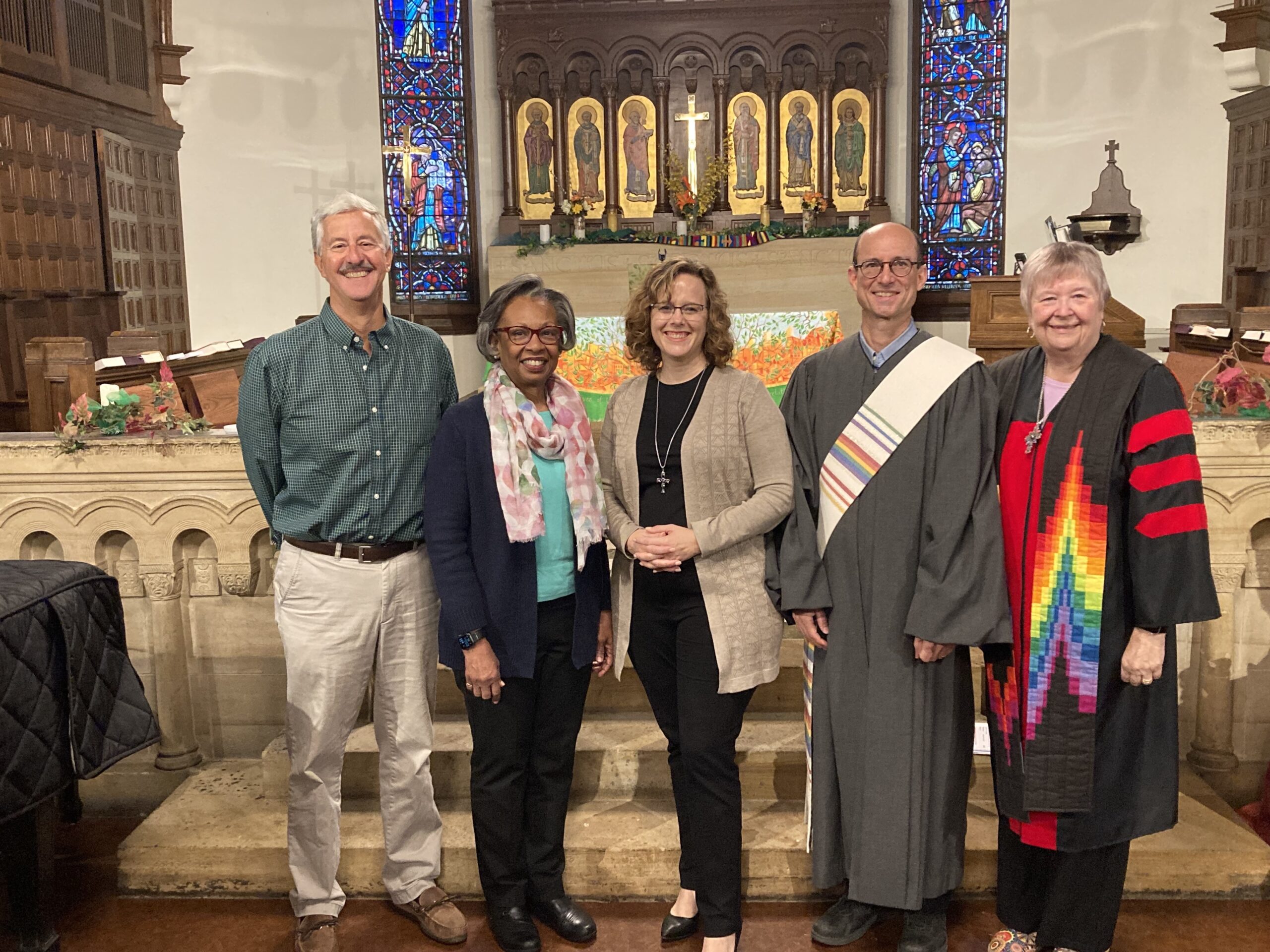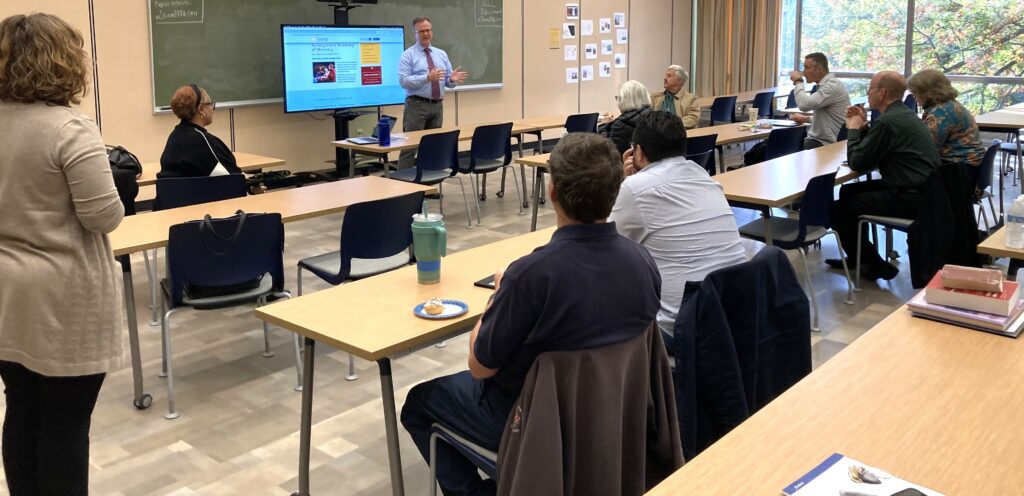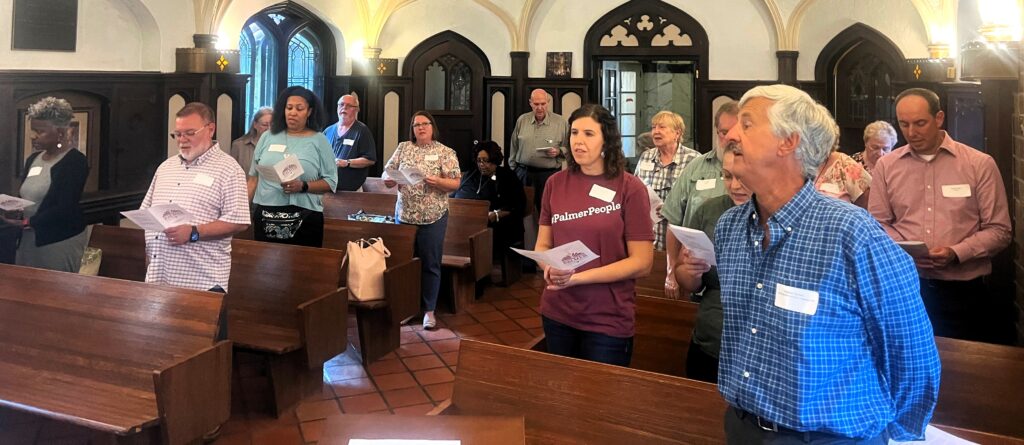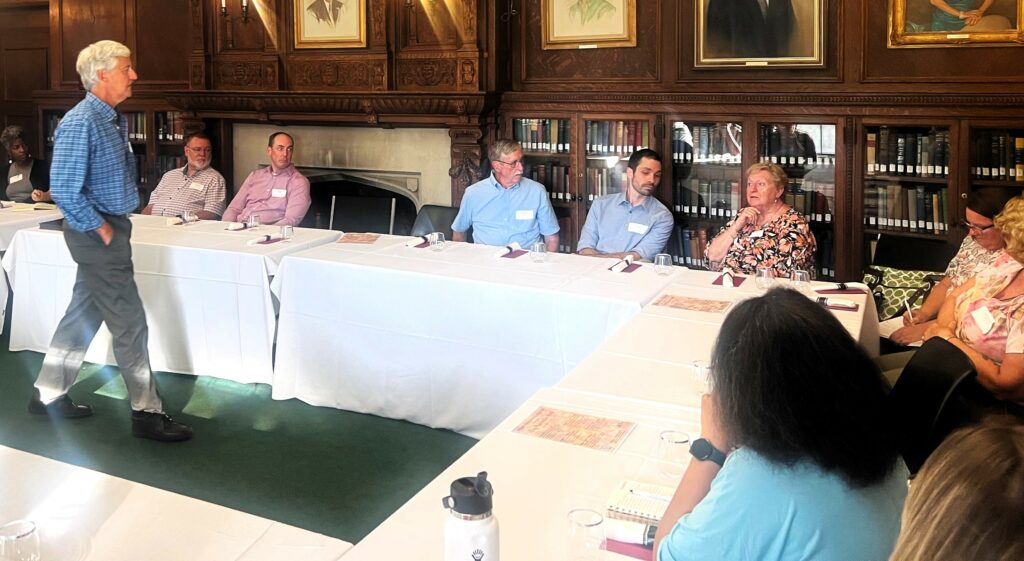 Pictured here at Lancaster Theological Seminary are (from left): keynote speaker the Rev. Steven Morton, and discussion leaders: the Rev. Carolyn Williams (LTS); the Rev. Jenny Freymoyer, West District
Superintendent; Rev. Darryl Stephens (LTS); and the Rev. Kathy Harvey-Nelson (LTS). Not
pictured is the Acting Associate Dean Greg Carey (LTS), who also spoke.
Pictured here at Lancaster Theological Seminary are (from left): keynote speaker the Rev. Steven Morton, and discussion leaders: the Rev. Carolyn Williams (LTS); the Rev. Jenny Freymoyer, West District
Superintendent; Rev. Darryl Stephens (LTS); and the Rev. Kathy Harvey-Nelson (LTS). Not
pictured is the Acting Associate Dean Greg Carey (LTS), who also spoke.
The number of young elders in The United Methodist Church reached a record low number in 2023, the Lewis Center for Church Leadership at Wesley Theological Seminary, reported in October. (The center also published in May, “Who will be God’s Agents of Pastoral Calling?”)
One way that Eastern PA, Greater New Jersey and other conferences are trying to reverse that trend—besides sponsoring Exploration of Ministry events—is by renewing a mission too many local churches have lost: Creating a Culture of Call. That mission means helping church members, especially young members, to hear, discern and respond to God’s call to ministry in their lives. And while the opportunities for ministry vocations are varied, what is critically needed are more pastors.
The Rev. Steven Morton, EPA’s Leadership Development Manager, has collaborated since fall 2022 with three area seminaries to offer Culture of Call gatherings of United Methodist students and alumni to discuss with faculty and staff how to enhance the appreciation, experience and response to the call and preparation for ministry.
Lancaster Theological Seminary convened such a gathering October 21 for a “Creating a Culture of Call” presentation and dialogue, preceded by worship. Led by Morton, participants discussed “advancing theological education to meet the changing needs of faith communities.” Acting Associate Dean Greg Carey also addressed the gathering, along with the Rev. Darryl Stephens, Director of United Methodist Studies and the Pennsylvania Academy of Ministry at Lancaster, and the Rev. Jennifer Freymoyer, West District Superintendent.

Also participating were the Revs. Kathy Harvey-Nelson (Susquehanna Conference), coordinator of Ministerial Formation, and Catherine Williams (Greater New Jersey) Assistant Professor of Preaching and Worship. Morton and Freymoyer talked with students and faculty before the event to hear about the seminary’s on-going curriculum re-development.
Topics included “must have” courses for today’s Master of Divinity students, favorite seminary memories and experiences, ways to help churches create a culture of calling to pastoral ministry, and how best to help and encourage gifted candidates now to explore ministry in EPA and education at Lancaster Seminary.
Alums noted cross-cultural experiences and the “authenticity of faculty” among their favorite memories and a need now for more attention to self-care among pastors (as a congregational responsibility) and more thorough preparation of clergy for the frequent need to become bi-vocational.
“I say that to develop a culture of call to ordained ministry, we must first identify and nurture the diverse vocations of all Christians,” said Stevens, a Deacon. Others mentioned the need for “stronger relationships with and among fatigued pastors and lessening of the relentless changes and business model of goal-setting” that can cause undue stress.
“If I was tasked with creating a culture of call, I would focus on creating a ministry community which was marked by creativity, vibrancy and joyfulness,” wrote the Rev. Bob Garvey later. A Lancaster alumnus, he is a pastor on the West District. “We would celebrate, magnify, glorify and exult our one true love: Jesus Christ. I would hold events which celebrated our joy!”
Palmer Theological Seminary hosted an earlier Creating a Culture of Calling to Pastoral Ministry event September 12, engaging students, alumni and faculty in similar discussions.

“I heard clergy colleagues retell their call stories and the events that led us through the doors of Palmer (formerly Eastern Baptist) Seminary,” recalled the Rev. Johnson Dodla, Director of United Methodist Student Advising and Ethos at Palmer. “These conversations reminded me that I am called not only to be a laborer in the vineyard, where the harvest is plentiful (Matthew 9:37-38), but I am also to recruit more laborers for the vineyard. The world needs deacons and pastors to proclaim the good news of the gospel.”
The Rev. Marsha Brown Woodard, Palmer’s Director of Supervised Ministries, found the conversations “informative and energizing.” She heard longtime alums of color recall racial discrimination that hindered their children from attending area public schools. But others shared her experience of seeing the school live into its motto, “The whole gospel for the whole world through whole persons,” even though “it shows up in different ways in different eras.”
She repeatedly heard comments about learning to value diversity in the classroom and in students’ conversations, “ranging from theological diversity to racial and ethnic, gender and sociological,” she said. “That became a value that they have carried into ministry.”
The American Baptist and Christian Church (Disciples of Christ) minister observed that “creating space in which questions can be asked, even when they cannot be answered, is important for those exploring the call and for ongoing nurture through continuing education.”

Attendees considered the subjects not taught in former times that are needed in seminaries today–including Church Finances, Conflict Resolution, Leadership Development, Technology, Helping People in times of Grief, Cultural Intelligence and Emotional Intelligence.
“I think this kind of gathering bears repeating,” she concluded. “It was helpful for seminary faculty to hear from alums about things that have been done and also ideas for doing more and doing it better in the present and the future.”
Morton hopes to see another Creating a Culture of Call event held at Moravian Seminary in Bethlehem, PA.
Learn more about the Culture of the Call by reading the Rev. Steve Morton’s “Culture of the Call” series of essays:
Creating a culture of calling to pastoral ministry is crucial now (Part 1)
Creating a Culture of Calling to Ministry (Part 2)
The Culture of the Call: The Influence of the Church (Part 3)
Also, visit our recently updated Ordained & Licensed Ministry / BOOM web pages. Read Exploring a Call to Ministry: “You may feel God is calling you. While all Christians have a ministry and a vocation or calling, some within the Church are called to servant leadership, both lay and ordained. You are encouraged to explore that calling by giving it prayerful consideration… Learn More
And if you still have questions, are sensing a call to ministry or just want to know, more here are key individuals who can help you explore your next steps:
- Interested in becoming an Elder? Contact Thomas Ebersole at 610-995-9075, T.Ebersole@wayneumc.org
- Interested in becoming a Deacon? Contact Darryl W. Stephens at 717-875-4751 or dws@darrylwstephens.com
- Interested in becoming a Local Pastor? Contact your respective District Superintendent
